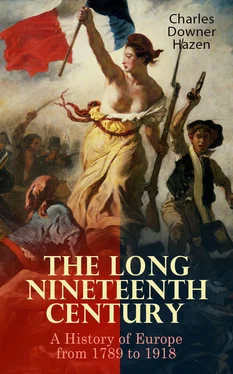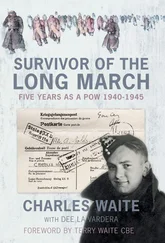Its effect was immediate and sensational. On the 4th of August, committee on the state of the nation made a report, describing the incidents which were occurring throughout the length and breadth of the land, chateaux burning, unpopular tax collectors assaulted, millers hanged, lawlessness triumphant. It was night before the stupefying report was finished. Suddenly eight o'clock in the evening, as the session was about to close, a nobleman, the Viscount of Noailles, rushed to the platform. The only reason, he said, why the people had devastated the chateaux was the heavy burden of the seignorial dues, odious reminders of feudalism. These must be swept away. He so moved and instantly another noble, the Duke d'Aiguillon, next to the King the greatest feudal lord in France, seconded the motion. A frenzy of generosity seized the Assembly. Noble vied with noble in the enthusiasm of renunciation. The Bishop of Nancy renounced the privileges of his order. Parish priests renounced their fees. Judges discarded their distinctions. Rights of chase, rights of tithes went by the board. Representatives of the cities and provinces gave up their privileges, Brittany, Burgundy Lorraine, Languedoc. A veritable delirium of joy swept in wave after wave over the Assembly. All night long the excitement continued amid tears, embraces, rapturous applause, a very ecstasy of patriotic abandonment, and by eight in the morning thirty decrees, more or less had been passed and the most extraordinary social revolution that any nation has known had been voted. The feudal dues were revolution dead. Tithes were abandoned ; the guilds, with their narrow restrictions, were swept away; no longer were offices to be purchasable but henceforth all Frenchmen were to be equally eligible to all public positions; justice was to be free; provinces and individuals were all to be on the same plane. Distinctions of class were abolished. The principle of equality was henceforth to be the basis of the state.
Years later participants in this memorable session, in which a social revolution was accomplished or at least promised, spoke of it with excitement and enthusiasm. The astonishing session was proclaimed closed with a Te Deum in the chapel of the royal palace, at the suggestion of the Archbishop of Paris, and Louis French XVI, who had had no more to do with all this than you or I, was officially proclaimed by the Assembly the "Restorer of French Liberty."
Thus was the dead weight of an oppressive, unjust past lifted from the nation's shoulders. Grievances, centuries old, vanished into the night. That it needed time to work out all these tumultuous and rapturous resolutions into clear and just laws was a fact ignored by the people, who regarded them as real legislation, not as a programme merely sketched, to be filled in slowly in detail. Hence when men awoke to the fact that not everything was what it seemed, that before the actual application of all these changes many adjustments must or should be made, there was some friction, some disappointment, some impatience. The clouds speedily gathered again. Because a number of nobles and bishops had in an outburst of generosity relinquished all their privileges, it was not at all certain that their action would be ratified by even the majority of their orders and it was indeed likely that the threatened contrary would prove true. The contagion might not extend beyond the walls of the assembly hall. And many even of those who had shared the fine enthusiasm of that stirring session might feel differently on the morrow.
This proved to be the case, and soon two parties appeared, sharply differentiated, the upholders of the revolution thus far accomplished and those who wished to undo it and to recover their lost advantages. The latter were called counter-revolutionaries. From this time on they were a factor, frequently highly significant, in the history of modern France. Although after the Fourteenth of July the more stiff-necked and angry of the courtiers, led by the Count of Artois, brother of the King, had left the country and had begun that 'emigration' which was to do much to embroil France with Europe, yet many courtiers still remained and, with the powerful aid of Marie Antoinette, played upon the feeble monarch. The Queen, victim of slanders and insults, was temperamentally and intellectually incapable of understanding or sympathizing with the reform movement. She stiffened under the attacks, her pride was fired, and she did what she could to turn back the tide, with results highly disastrous to herself and to the monarchy. Another feature of the situation was the subterranean intriguing, none the less real because difficult accurately to describe, of certain individuals who thought they had much to gain by troubling the waters, such as the Duke of Orleans, cousin of the King, immensely wealthy and equally unscrupulous, who nourished the scurvy ambition of overthrowing Louis XVI and of putting the House of Orleans in place of the House of Bourbon. All through the Revolution we find such elements of personal ambition or malevolence, anxious to profit by fomenting the general unrest. At every stage in this strange, eventful history we observe the mixture of the mean with the generous, the insincere with the candid, the hypocritical and the oblique with the honest and the patriotic. It was a web woven of mingled yarn.
Such were some of the possible seeds of future trouble. In addition, increasing the general sense of anxiety and insecurity, was the fact that two months went by and yet the King did not ratify or accept the decrees of August 4, which, without his acceptance, lacked legal force. Certain articles of the constitution had been already drafted, and these, too, had not yet received the royal sanction. Was the King plotting something, or were the plotters about him getting control of him once more? The people lived in an atmosphere of suspicion; also thousands and thousands of them were on the point of starvation, and the terror of famine reinforced the terror of suspicion.
Out of this wretched condition of discontent and alarm was born another of the famous incidents of the Revolution. Early in October rumors reached Paris that at a banquet offered at Versailles to some of the crack regiments which had been summoned there the tricolor had been stamped upon, that threats had been made against the Assembly, and that the Queen, by her presence, had sanctioned these outrages.
On October 5 several thousand women of the people, set in motion in some obscure way, started to march to Versailles, drawing cannon with them. It was said they were going to demand the reduction of the price of bread and at the same time to see that those, who had insulted the national flag should be punished. They were followed by thousands of men, out of work, and by many doubtful characters. Lafayette, hastily gathering, some of the Guards, started after them. That evening the motley and sinister crowd reached Versailles and bivouacked in the streets and in the vast court of the royal palace. All night long obscure preparations as for a battle went on. On the morning of the 6th the crowd forced the gates, killed several of the guards, and invaded the palace, even reaching; the entrance to the Queen's apartments. The Queen fled to the apartments of the King for safety. The King finally appeared on a balcony surrounded by members of his family, addressed the crowd, and promised them food. The outcome of this extraordinary and humiliating day was that the King was persuaded to leave the proud palace of Versailles and go to Paris to live in the midst of his so-called subjects. At two o'clock the grim procession began.
The entire royal family, eight persons, packed into a single carriage, started for Paris, drawn at a walk, surrounded by the women, and by bandits who carried on pikes the heads of the guards who had been killed at the entrance to the palace. "We are bringing back the baker, and the baker's wife, and the baker's son!" shouted the women. At eleven o'clock that night Louis XVI was in the Tuileries.
Читать дальше












